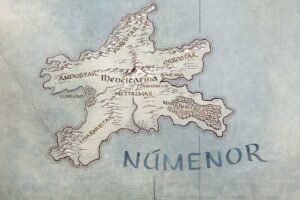We’ve all been waiting hungrily for something, anything, to give us a deeper insight into Amazon Prime’s upcoming prequel to The Lord Of The Rings. So, when a bit of news drops that’s actually surprisingly revealing and at the very least full of stuff to talk about, the fact that it gets barely any coverage is…well, disappointing. But don’t fear – I am here, to tell you everything you need to know about the new characters we now know will populate Amazon Prime’s Middle-earth.

We’ve understood for a rather long while that there are four major characters in the series who are going by the codenames Tyra, Eldien, Beldor and Aric. They’re generic fantasy names, and there’s no precedent for any of them in Tolkien’s own writings, so it’s possible (even likely) that they are just codenames, nothing more than that. But for a while, that was all we knew about any of these four leads: basic names that could have come out of any Fantasy Name Generator online. We were able to attach a gender to the name of Tyra, because Australian actress Markella Kavenagh was supposedly in talks to play that character. But now, we have new information about all four, due to some newly uncovered audition tapes for the series.
Before we break them down, remember that these scenes, like the Mirror of Galadriel, could be very unreliable guides. The dialogue being used in these actors’ auditions is complex enough that it could in fact be edited together from an actual version of the show’s script, but don’t count on it: while it might be an indication of the sort of material to expect from the series, it’s highly probable that we never see any of these scenes (or anything even remotely resembling these scenes) in the show – this sort of scene and dialogue is usually expressly written to give the auditioning actor a sense of the character they might be portraying, from personality to manner of speech. For instance, you’ll note that the character of Eldien and Beldor both have the same scene, but with very different dialogue. With all that said, you will join me, with bated breath, as we begin our first deep dive into Amazon Prime’s Middle-earth. The time is sometime in the Second Age, thousands of years before the events of either of Peter Jackson’s trilogies. The setting…well, we’ll discuss that as we go along.
All four audition tapes have been deleted, presumably by Amazon Prime’s bidding, but the wonderful folks over at Redanian Intelligence who uncovered the videos were able to transcribe them before their disappearance (and I was able to watch two of them as well).
The first two videos focused on the character of Tyra: the dialogue indicates that Tyra is an elf, with a compassionate nature, who also seems to be deeply insightful and/or gifted with some powers of foresight. She and another woman are riding in a wagon when they hit a man, who would appear to have been knocked unconscious by the blow: Tyra demands that they stop and help him, while her companion argues that, if they take him back to their home, “anything bad that happens as a result of it will be our fault”. Tyra, however, appears to have won the argument by the time the scene ends. There is one possible clue about the setting of this scene: references to wild bears and snow, which would presumably suggest that Tyra and her friend live somewhere in the forested north of Middle-earth, most likely in the kingdom of Lindon, where Gil-galad ruled the largest contingency of Elven-folk. And that raises an interesting point – who is this man that Tyra and her friend encounter, and what would happen if they brought him back to their home, or village? We know from Tolkien’s own writings that the Dark Lord Sauron entered Lindon in disguise sometime early in the Second Age: could he be this strange man? It seems unusual that he wouldn’t take the form of an Elf, however, when trying to infiltrate an Elven kingdom.
What we gather from this scene is that Tyra and her people are very rural Elves – they drive wagons, they live in a wild, dangerous part of Middle-earth, and, aside from Tyra herself, they appear to be wary and distrustful of strangers.
The second audition tape, also deleted, features Tyra in a different scene: here, she and a girl who is most likely her younger sister, find themselves lost in a dangerous place after an attempt to forage for berries in the woods leads to the girl losing her doll and straying away from Tyra’s care. It’s a sweet little scene, and it shows Tyra taking the lead in a difficult situation.
Again, the scene suggests a rural, woodsy setting. If I had to guess, I’d say Tyra is almost certainly a Silvan Elf, more akin to the Wood Elves of Mirkwood than the High Elves of the West. None of the characters in these two scenes use very archaic dialogue, as opposed to the third scene, which focuses on the character of Eldien.
Eldien is possibly the most interesting and complex of the four, based on the little we know of her personality. I was fortunate enough to see the video of Chloe Bremner’s audition for the role prior to its being taken down, and I thought Bremner did an okay job with the material. Eldien is in every way the opposite of Tyra: she is most likely a High Elf, and her vocabulary and philosophies are far more extensive than those of her rural co-star. In the scene, Eldien is approached by her longtime friend Beldor, perhaps at a banquet or after some kind of memorial ceremony for the Elves who died in the wars of the First Age. Eldien herself is a veteran of those wars, and bears with her an everlasting pain, much like Frodo’s at the end of The Lord Of The Rings. But while Frodo was granted the opportunity to pass into the West and find healing, Eldien is an Elf who rejected the West and is now being forced to pay the price, living out her life in the utter loneliness of Middle-earth. Beldor offers her a potent drink, but Eldien rejects it, saying that no wine can cure her sorrows. She speaks about “the nameless dark” (i.e. Morgoth, the great enemy of the First Age), and mentions having killed dragons in her time – note the plural: Eldien didn’t just get lucky and happen to kill a dragon once, she’s literally one of the greatest warriors in all of Middle-earth. But despite being so aware of evil, Eldien seems like she could be the perfect target for Sauron when he inevitably rises to power: in her desire to find healing and joy in Middle-earth, Eldien might be easily tricked into joining Sauron when he promises to rebuild the world, greater and more beautiful even than the Western lands of the gods. Like Sauron, she has ambition and seems driven by purpose. Unlike Sauron, though, she is a mother, something that is revealed at the end of the scene when Beldor tells her to go home: “if not for yourself…do it for your son”. Eldien grows angry and threatens to end their friendship if ever he uses her family against her again. Clearly, there’s tension between them, though it doesn’t seem to be romantic, which is a relief. Beldor, in fact, appears to be much younger than Eldien. He doesn’t recall the great wars against Morgoth, and Eldien tells him that he is blessed because, for him, evil is merely “pictures set in a glass of the cathedral windows” -an interesting comment, considering that cathedrals aren’t typically seen in Middle-earth: again, remember that all of this dialogue is probably fabricated – it’s just there to give a sense of the character.
And the sense that I get from the character of Eldien is that she’s a great, even legendary heroine, possibly on the level of Galadriel: or is it possible that she is, in fact, Galadriel? I know, I know, she references a son, and we all know Galadriel never had one: or did she? Tolkien himself revised and rewrote Galadriel’s backstory multiple times toward the end of his life, and in one version Galadriel was in fact the mother of Amroth, the prince of Lórien who would one day be immortalized in Legolas’ tragic ballad of Amroth and Nimrodel. I’m not saying this is the case here, but it is something worth noting.
Beldor’s version of the scene, acted rather less convincingly by Conor Fogarty, is confusing: Beldor approaches Eldien and tries to convince her to go into the West, as in the previous scene, but here his intentions seem sinister – he mentions that it is the will of “our chieftain” that Eldien must depart, and the pronouns he uses reveal that the chieftain is a woman, which is interesting. But neither he nor the chieftain have Eldien’s best interests at heart, it seems, since Beldor appears to be trying to get Eldien drunk – he tells her that he carelessly poured “fire ale” into her goblet, and as the scene ends Eldien asks him what he put into the drink: to which Beldor replies “Is it working?”. Suspicious! Is this a kidnapping that we’re witnessing in this scene? At first I suspected that Beldor could be the codename for Elrond, who fits the bill of being a High Elf warrior young enough not to have fought in the wars of the First Age but old enough to have a place of some importance in the early Second Age: but somehow I can’t imagine someone as wise as Elrond ever intentionally doing this to someone he considered a friend. The reference to a female chieftain is interesting, since it would appear to be Galadriel at first glance, meaning Eldien might not be a codename for the Lady of Lórien after all. Or is this chieftain a new, wholly original character created for the show?
Finally, we have Aric: a roguish, selfish trickster who is perfectly prepared to sacrifice anybody, even his own friends, to get himself out of a predicament. In his first sample scene, performed by Nick Hardcastle, Aric takes refuge with an unnamed woman who seems to have interacted with him before: the two are not on good terms, but could develop a friendship as time goes on, depending on how callous Aric really is – he certainly has no problems with deserting his own people to the whims of an unidentified but clearly unfriendly power. The woman tells him that he’s “monstrous”, and Aric simply replies that “there’s no room for mercy if one wants to survive”. He then turns the tables on her, asking her what her own choice will be: if she will cast him out or protect his secret in exchange for his own help. We don’t hear her answer, but it’s clear from the setting of the next scene that she agrees to help him.
We’ve gathered a lot of information about Aric already: he is the only one in the group of four who might be a human, and his storyline appears to take place during a time of warfare in Middle-earth: the people whom he betrays are refugees, “injured…a thousand miles from safety”. He speaks of soldiers, and hounds trained to hunt men. His demeanor suggests an antihero or ruffian: and everybody loves one of those.
Let’s take a look at the final scene. In this one, Aric and the same woman are traveling, and have just escaped a run-in with soldiers – but when Aric asks where the soldiers came from, his companion responds oddly: “There are many places in this world stranger than you can imagine, older than you ever visited”. Does this suggest that Aric and the woman might have run into non-human foes: orcs, perhaps, returning from the mountains to wreak havoc on Middle-earth? And how does his companion even know about them – unless she herself is not a human, but an Elf? Honestly, I can’t shake the feeling that her speech pattern strongly resembles that of Eldien, whom we already know might be forced to leave the safety of her Elven homelands: Aric himself is clearly wary of the woman, and asks her why she was “voluntarily separated from her squadron”. He also references the strength of her will and her pride, two things we can already establish that Eldien has in plenty; and he reprimands her for speaking in flowery language and not saying what she means – something that Elves are always being accused of in Tolkien’s works. Regardless of who she is, Aric’s own identity comes to light, at least a little, in this scene. He and the woman get to talking about “farlanders”, a strange term that might possibly refer to the Men of Númenor on their far-distant island in the Western Sea. These farlanders might not be great people, Aric seems to concede, but they aren’t the ones responsible for throwing him out of his home, leaving him with nothing. But he is resigned to his fate as an outcast, and he notes, as the scene ends, that he can’t do much about it without an army, anyway.
From this scene, we gain one or two details: firstly, Aric and his companion are on their way to a castle, though no reason for that destination is given. Aric notes that, even if they do reach the castle, his safety is not guaranteed, suggesting that he has a reputation as a troublemaker throughout Middle-earth. Who could he be? Is he, perhaps, Sauron in one of his many disguises, and is his companion then bringing him to one of the Elven refuges where Sauron fears he may be found out? Why, then, wouldn’t he simply try to kill this woman or turn her away from her determined course? If he is Sauron, then his tragic backstory is in fact a lie, though one with a grain of truth: he was thrown out of his home and left with nothing, by the decree of the gods. And it would be ironic if this were him paying no heed to the “farlanders” on their distant island, when Sauron would one day be responsible for bringing about the destruction of the island of Númenor and almost all its people.
In conclusion, we have four very interesting and unique characters here: Tyra, a lovable Silvan Elf who wants nothing more than to save lives and help people; Eldien, a High Elven warrior with poison in her heart, looking for peace in her time; Beldor, a loyal servant of his chieftain obliviously following orders, even if it means hurting a friend; and Aric, a rogue of unclear origins, moving through Middle-earth and leaving a trail of destruction wherever he walks.
I’m very interested to hear all your own theories about these four characters, and what you think of the dialogue and scenes. Share your thoughts in the comments below and keep your fingers crossed that Amazon Prime release some official news soon!


